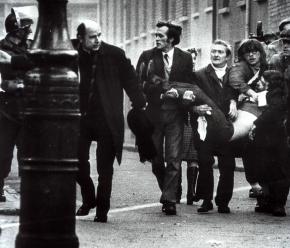Bloody Sunday’s long shadow
, a witness to the 1972 Bloody Sunday massacre in Northern Ireland, looks at what to expect from the Saville Tribunal, which has carried out a decade-long inquiry into the killings of unarmed protesters by British troops.
A STEADY increase of acrimony over Bloody Sunday is underway as publication of the report of the Saville Tribunal approaches.
It was confirmed last week that Lord Saville is confident of hitting his target of the week beginning March 22. Twelve years in the making at a cost of more than $250 million, there has never been anything like it--and won't be again.
The enactment of the 2005 Inquiries Act apart, dismay at the length and cost of the proceedings has not been confined to recalcitrant Unionists in Northern Ireland and scions of the British elite. Derry Democratic Unionist Party chieftain Gregory Campbell has been to the fore in maintaining that the tribunal has been an expensive sop to nationalism, pitching his argument in terms which make plain that Protestants who take any other view are letting the side down.
Nationalist politicians argue that the real reason Gregory harps on about the inquiry is that he doesn't put much value on the lives of Catholics killed by the security forces. As for themselves, they aver, not always plausibly, they have always held that you cannot put a price on truth and justice.

In fact, the main reason the inquiry has cost so much and taken so long has to do with the nature of the Bloody Sunday event--not to forget the elegant and meticulous ponderousness of the judiciary. The tribunal was tasked to look for the truth not only about Bloody Sunday as a single episode, but about each individual killing and wounding, of which there were 27.
The evidence might lead to a finding of unlawful killing in one instance, of self-defense in another. The only way of determining which fell into which category was to study the evidence given at the time, question surviving eyewitnesses and summon what forensic evidence remained.
That every killing and wounding was witnessed by at least a dozen--in some cases scores--of witnesses is the prime reason oral hearings occupied 404 days, and that the report will be the equivalent of 15 average-length novels.
This, compounded by the astonishing fees commanded by lawyers of varying levels of competence, in criminal and civil proceedings as well as at tribunals, helps explain the staggering cost of the exercise.
BUT THESE are not the key considerations and should not be at the heart of debate. By far the most important factor is that when the state kills its citizens, it is in the interest of all that it be called to account.
When Unionist politicians say that the Protestant community has nothing to gain from the Saville exercise, they imply that Protestants should regard the state as having an untrammeled right to do with them, too, what it will.
Which is somewhat pathetic and not a little insulting in light of the disdain which the British state has shown for the Protestant people for decades. To see Bloody Sunday as an atrocity perpetrated on the other side is to see it in a false perspective.
Gregory's most persistent riff on Bloody Sunday is that everybody already has his or her mind made up, making this elaborate pursuit of the truth redundant and futile. But many of us who sat through the hearings found our prior views severely challenged.
For many years, countless people believed--I was among them--that the main motive for the assault on the Bogside had been to shore up the Unionist government at Stormont. At the time, Brian Faulkner, the prime minister of Northern Ireland, and his administration were under intolerable pressure from forces around Ian Paisley and William Craig over the failure of the security forces to bring the Bogside/Creggan no-go area to an end.
Five days before the assault, two backbench MPs resigned the Ulster Unionist whip rather than support a motion of confidence in Faulkner and the security policy in which he had allegedly acquiesced. It seemed no more than common sense that the paratroopers were unleashed in Derry to save Faulkner's skin.
I wrote this down in books and pamphlets and dozens of newspaper articles. But I was wrong. No convincing evidence emerged at the hearings to sustain my view. The evidence of Robert Ramsey, private secretary to Brian Faulkner at the time, was especially persuasive on this point and was confirmed in Army memos and other military documents produced in evidence.
On the other hand, there was plenty of evidence that the key factors were the rage of senior Army officers at the insult to their conception of military propriety, even their "honor," which the no-go area represented.
That, plus the fact that London politicians and civil servants at the highest level, blithely careless of the implication for the safety of citizens, gave the go-ahead to the officers concerned. Saving Stormont had little to do with it. The interests and aspirations of the Protestant people figured not at all.
Whether this view of the reasons for the design and launch of the operation is upheld by Lord Saville, we must wait and see. If he finds differently, I'll argue that he's gotten this one wrong. What denouncing Saville in advance, on grounds of time and cost to the exchequer, reveals is unease about what he might find.
First published in the Belfast Telegraph.


